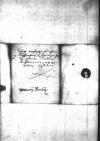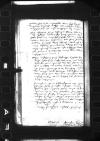List #564
Stanisław KOŚCIELECKI do Ioannes DANTISCUSJasiniec, 153[3]-11-24
| odebrano [1533]-11-28 Rękopiśmienne podstawy źródłowe:
Pomocnicze podstawy źródłowe:
Publikacje:
| ||||||||||||
Tekst + aparat krytyczny + komentarz Zwykły tekst Tekst + komentarz Tekst + aparat krytyczny
Jego Miłości Panu, panu
Miłościwy Panie Biskupie, panie moj łaskawy.
Rad wiem, iż Twa Miłość za łaską boską dobrze zdrow, ktoreż to miłe zdrowie Twej Miłości tym to listem nawiedzam a Twej Miłości służby swe w łaską pilnie zalecam.
Pan
A tak, Miłościwy Panie, gdyż Twa Miłość raczysz takową konfidencyją we mnie mieć, na ktorej się Twa Miłość, pan moj, wiecznie mylić nie masz, będę jemu, to jest panu
Co się tycze peregrynacyjej, jam zawsze na tym jest, abych wielkich panow, mądrych, uczonych słuchał, a zwłaszcza panow biskupow, ktorzy mają w ręku swych odpusty i też dyspensacyje. A tak, Miłościwy Panie Biskupie, już ja tak uczynię, jako Twa Miłość pisać raczysz. A wszekoż, Miłościwy Panie, racz tego, Twa Miłość, pewien być, iże ci to żaczkowie, ktore ja ku tej nowej szkole Twej Miłości jednam, podobać się będą, nie telko na on czas, kiedy na polach kwiecie będzie, ale i w dzien ciemny a niepogodny za miłe a wdzieczne być mają. Jać, Miłościwy Panie Biskupie, stary bakalarz, nic nie stoję o doktorowskie szaty czerwone, to jest szata ma najwdzięczniejsza czarna, a tak w tym czarnym caputium będę swej zwykłej a dobrej powieści dosyć czynił, tak iż Twa Miłość, moj łaskawy pan, żadnej lekości ze mnie mieć nie masz ani ci to mili żaczkowie, ktore ja jednam ku tej to nowej szkole Twej Miłości, panu memu.
Moj Miłościwy Panie Biskupie, ci to żaczkowie pytali mię, aczby też Twa Miłość rad lekcyj[e] czytał. Jam upewnił ty to studenty, iż Twa Miłość rad czytać będziesz, a tak pilnie proszę, nie racz mię, Twa Miłość, zwodzić. Wieleć[by] to na mię, tak starego bakalarza, abym w tej pracy sam być miał. Pomagaj, Twa Miłość, na Boży dom, będzie-ć to studento[m] barzo wdzięczno.
Poruczyłem panu
Przy tym swe wieczn[e] a powolne służby Twej Miłości, panu memu, pilni[e] w łaskę zalecam a długo od Pana Boga T[wą] Miłość zdrowego być żądam.
Datum
V
Waszej Pańskiej Miłości powolny służebnik


